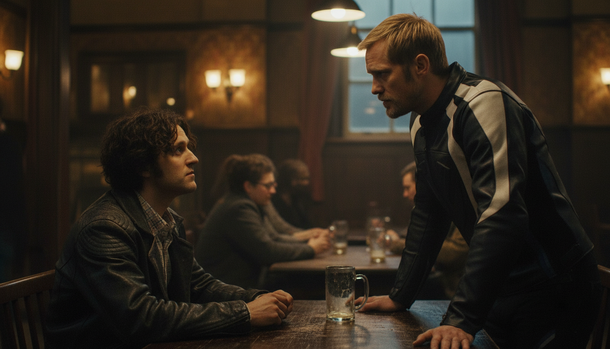Pillion Breaks the Mold: Skarsgård and Melling Redefine On-Screen Intimacy and Power

Pillion shatters rom-com stereotypes with raw, daring storytelling. Skarsgård and Melling deliver unforgettable performances. The film explores power, vulnerability, and self-discovery. Dive into a bold new take on modern relationships.
Forget everything you think you know about romantic comedies—Pillion is here to upend every expectation. This film, inspired by Adam Mars-Jones' novella Box Hill, refuses to fit neatly into any genre box. Instead, it plunges viewers into a world where desire, dominance, and vulnerability collide, offering a story that is as provocative as it is deeply human.
At the heart of the film is Colin, played with remarkable subtlety by Harry Melling. Colin is a quiet, unassuming parking attendant, still living under his parents' roof in the suburbs. His life takes a sharp turn after a chance meeting with Ray, a magnetic biker gang leader portrayed by Alexander Skarsgård. What begins as a spontaneous encounter on Christmas Eve quickly spirals into a complex relationship defined by power dynamics and unspoken needs. The connection between Colin and Ray is anything but typical—there are no grand gestures or easy laughs, and the film never lets the audience settle into the comfort of familiar tropes.
Ray's world is one of strict rules and rituals. He brings Colin into his home, assigning him domestic tasks and enforcing boundaries that blur the line between care and control. Colin, at first, finds a sense of belonging in this new role, but as time passes, he starts to crave something more—something Ray may not be willing or able to give. The film doesn't shy away from the discomfort that comes with exploring these themes. Instead, it leans in, allowing the audience to feel the tension and uncertainty that define Colin's journey.
Despite its intensity, Pillion is not without moments of levity. Melling infuses Colin with a gentle awkwardness that brings a bittersweet humor to the story. These lighter moments never undermine the gravity of the relationship at the film's core; rather, they highlight the complexity of human connection. First-time director Harry Lighton demonstrates a deft touch, ensuring that the film's humor is always empathetic and never cruel.
Unlike its literary predecessor, which was shaped by the anxieties of the late 20th century, the film version of Pillion is set firmly in the present. This shift allows for a more nuanced exploration of identity and acceptance. Colin's family, for instance, is portrayed as supportive and open, a stark contrast to the secrecy and shame that colored the original novella. This change brings a sense of hope and possibility to the narrative, even as it grapples with difficult subject matter.
One of the film's most striking achievements is its authentic portrayal of the subculture it depicts. Real members of the Gay Bikers Motorcycle Club appear on screen, lending credibility and depth to the world Ray inhabits. The film treats its characters and their community with respect, avoiding sensationalism even in its most explicit scenes. This commitment to authenticity extends to the performances as well. Both Skarsgård and Melling deliver fearless, emotionally raw portrayals that capture the vulnerability and strength required to navigate such a relationship.
Pillion does not sanitize or romanticize the challenges faced by its characters. The film confronts issues of consent, power, and self-worth head-on, refusing to offer easy answers. Yet, it also celebrates the freedom that comes from embracing one's desires and forging a path toward self-acceptance. By the film's conclusion, Colin emerges transformed—more confident, more self-aware, and ready to claim his own happiness on his own terms.
With its bold storytelling and unforgettable performances, Pillion stands as a testament to the power of cinema to challenge, provoke, and ultimately inspire. This is not just another love story—it's a fearless exploration of what it means to truly know and accept oneself, no matter how unconventional the journey may be.